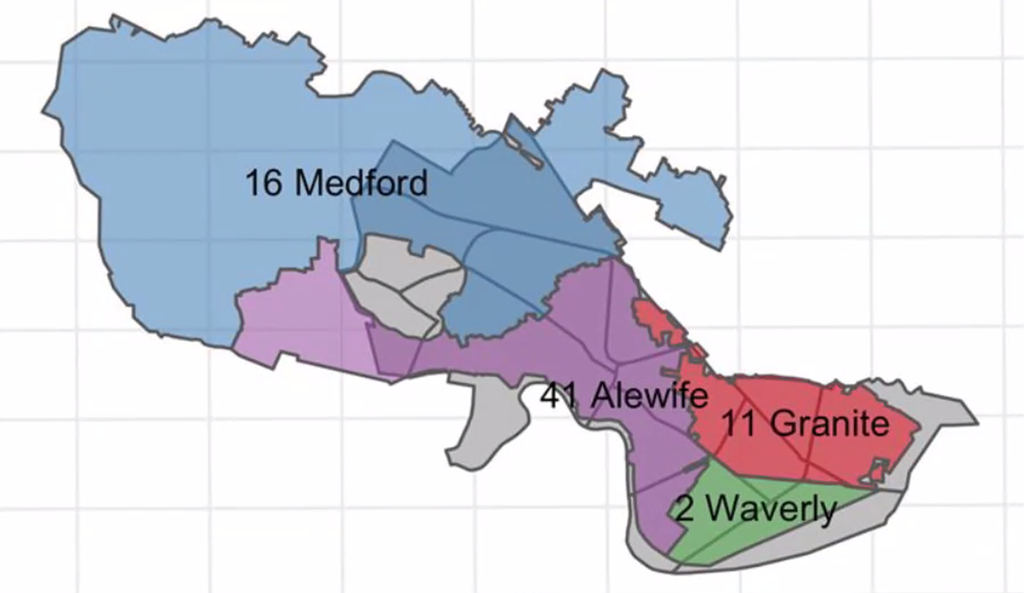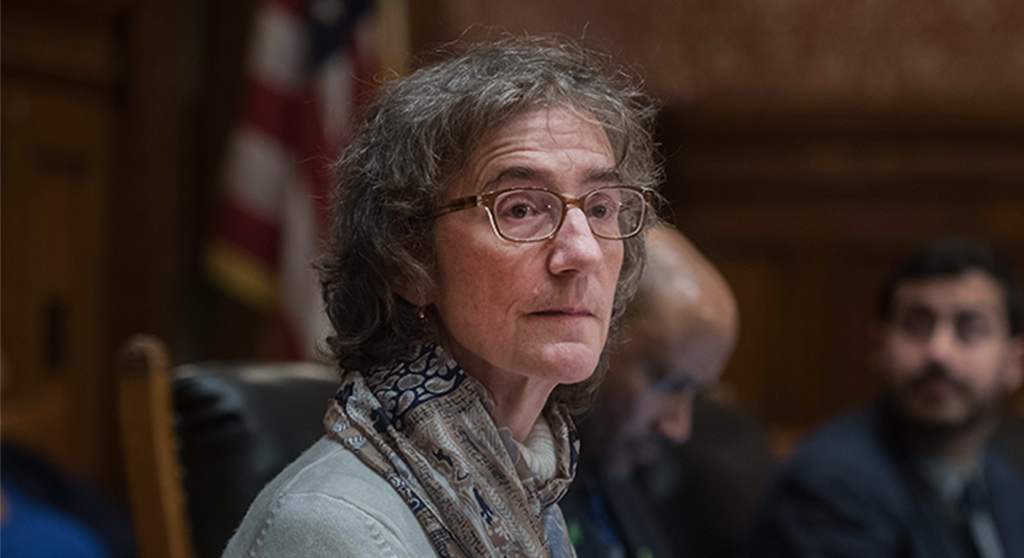Declare health emergency to keep kids learning, councillor urges; Shutdown metrics still in flux

City councillor Patty Nolan has proposed a public health emergency to keep students attending in-person classes. She is seen here at a January meeting. (Photo: Derek Kouyoumjian)
The closing of Cambridge Public Schools to in-person learning that begins Thursday should be canceled through the declaration of a public health emergency, city councillor Patty Nolan told city staff at a Monday meeting. The kids are safer from the coronavirus in school than at home, she said.
The shutdown of in-person learning for 1,604 mostly younger and special ed students was announced Sunday as reports of new Covid-19 cases surged citywide. It will last at least until Dec. 17 as officials monitor the three metrics that trigger a shutdown in hopes of seeing a reversal: Under current district rules, in-person learning can resume only when at least two of the metrics stay below the threshold for seven consecutive days.
But those metrics, adopted just mid-November, have already been set for a reassessment in January, Mayor Sumbul Siddiqui said.
“The next look at the metrics, or maybe no metrics, will be early January,” Siddiqui said. She’d hoped the metrics would hold until the upcoming holiday break, she said.
The January reassessment has been mentioned in recent discussions among the School Committee, which Siddiqui leads, and at a Dec. 4 subcommittee meeting, the mayor said. The district’s Covid-19 data dashboard mentions one for January and then again for March.
State education officials have urged school districts in Boston, Worcester and Springfield to get some students back in classes even though those communities are seeing bigger spikes in Covid-19 cases than Cambridge, Nolan said.
“Springfield’s and Worcester’s case rates are double our case rates. And yet the commissioner is saying those districts really should have students in school. So why can’t we declare a public health emergency and open our schools for students? It’s a public health emergency – an emotional, psychological and literal emergency for so many of our families,” Nolan said. Students have lost much of a year in terms of learning and “are way, way behind.”
“Not just a rhetorical statement”
The call to reopen schools drew mainly a long silence from the city manager and his top public health deputies – all attending the council meeting remotely – save for a comment from chief public health officer Claude Jacob that “we are paying close attention to the ongoing impacts … And yes to your core point that relatively speaking, Cambridge is doing very well, but recognizing that this is an ongoing brushfire out there that we’re trying to put out.”
Nolan underlined to Jacob the seriousness of her suggestion.
“That that was a serious, heartfelt, actual plea, not just a rhetorical statement. I really think it would be best for students and families,” Nolan said.
The district’s Covid-19 data dashboard showed Monday that two of the three metrics it tracks are in the red: a seven-day average of new confirmed cases per day for every 100,000 people in Cambridge, which stands at 27.7 when the threshold is 25; and the tracking of the coronavirus in Eastern Massachusetts wastewater, which shows 658.5 copies of the genome per milliliter when the threshold is 100. The third metric – positivity rates compared with the number of tests done citywide – is far below its trigger amount.
Waiting on wastewater

Three wastewater samples sites for coronavirus have been in place for weeks; “Medford” has just come online, the city engineer said Monday. (Image: City of Cambridge)
But Nolan didn’t understand why the wastewater metric still looked at the 61 communities in Greater Boston that feed into a treatment plant at Deer Island in Boston Harbor, when plans have been in place for weeks to look only at wastewater sampling from within Cambridge – and there is already several weeks of data shown in notes from the city’s Expert Advisory Panel. “Since we know we’ve had it for three weeks, what’s going on?” Nolan asked.
Though the sampling was originally to be from three spots in Cambridge and those are producing data, Jacob said, the city and collection company Biobot agreed to add a fourth collection point in the northwestern part of the city (referred to as the “Medford” location), albeit one that samples outside the city as well. “We’re still missing the fourth collection site,” Jacob said; Department of Public Works city engineer Kathy Watkins said a moment later that the fourth location came online this week and “I think we have those four locations set up now and are proceeding with those on a weekly basis.”
More certainty in an emergency
Watkins suggested that the addition of the “Medford” location to “Alewife” (center and southwestern parts of the city), “Waverly” (a southeastern portion) and “Granite” (mainly East Cambridge, with a sliver creeping westward along the Somerville border) was to enlarge sampling for more certainty about coronavirus trends and reduce the “noise” that would leave the trends less clear.
Especially with notes from the Expert Advisory Panel not reflecting the concern, though, Nolan was bewildered.
“The whole reason we’re doing sewage, I thought, was that it shows [Covid-19 trends] much quicker even than testing data,” Nolan said. “Why not go with what we have? We are in a pandemic emergency.”
City staff’s explanations “are not really adding up for me as to why we still haven’t seen the data, when the expert advisory panel has seen it,” Nolan said.
This post was updated Dec. 8, 2020, after a conversation with Mayor Sumbul Siddiqui to say that a January reevaluation of school shutdown metrics has been mentioned at recent School Committee meetings.


